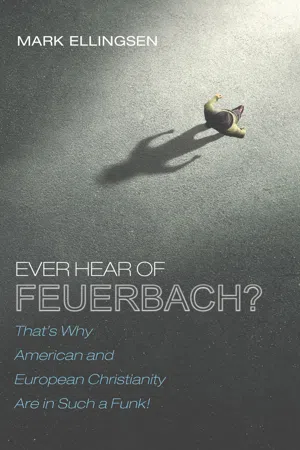![]()
1
Who’s This German Guy, and What’s He Got to Do with the Church’s Funk?
Karl Barth Will Tell You
Ever hear of Ludwig Feuerbach? Know what he says about Christianity? And if you have heard of him, are his ideas on your mind a lot? Is he a conversation partner for what you do and say theologically?
My guess is that your answer to (at least most of) these questions is in the negative. And the very fact that we are not worrying a lot about this nineteenth-century German philosopher (an important influence on Karl Marx) explains why the church in Europe and America is in such a funk!
Let’s begin with what all observers of religion and most theologically interested Christians know about American Christianity. American churches (especially those of the mainline) are losing ground, in terms of membership, financial resources, and social impact. The media made much of 2016 polls regarding the growth of the Nones (Americans with no religious affiliation). According to a 2017 Washington Post/ABC News poll, more than one in five Americans (21 percent) fall into this category. In 2018, the Gallup Poll reported the number of religiously unaffiliated to be 20 percent (26 percent according to the most recent Pew Research Center survey). This is a striking increase from the late 1940s and 1950s, when, according to Gallup poll calculations, only 2 to 3 percent fell into this category. By the 1970s the number reached 10 percent. But the big growth spurt began in 1986, with a dramatic increase in the religiously unaffiliated since 2003. According to a poll taken in 2019 by the Pew Research Center, four in ten young adults are religiously unaffiliated. The Pew Research Center also reported in 2018 that nearly half of Canadian young adults have no religious affiliation, and another poll found 53 percent of the British public fall into this category.
Correspondingly, Gallup reports that church membership has dropped from a high of 73 percent in 1937 to 50 percent in 2018 (down from 56 percent in 2016). This has implications for reported church attendance. Reported attendance in religious services was only 23 percent in 2019 according to Statista, down from a high of 49 percent in the 1950s. (Polls suggest the unreliability of these statistics. They have been and likely still are inflated, as people seem to overestimate their religiosity when polled.) Tied with these numbers is the growing sense among Americans that religion is losing influence in American society. A 2019 Pew Research Center poll reported that 78 percent of us believe this to be the case.
The situation in Western Europe is worse, Gallup/International reported in 2015. In the United Kingdom only 30 percent describe themselves as religious. Germany is not much better, with 34 percent of the population perceiving themselves this way. It gets worse in the Netherlands (26 percent) and bottoms out in Norway (21 percent) and Sweden (19 percent). Since Christianity is the dominant (even state-sponsored) religion in these nations, the conclusion is obvious. The church is not just in a funk in Western Europe. It’s on life support.
This poll data seems to confirm what Ludwig Feuerbach (1804–72) said about religion nearly two hundred years ago. Essentially what he claimed (we’ll analyze how he arrived at this conclusion in more detail later) is that religion is nothing more than the objectification of who we are. We have taken the best aspects of our human nature, objectified and personified them, and then transformed the result into an object that we worship! If this sounds like Karl Marx and his idea that religion is a human creation, the opiate of the people, it should be no surprise. Marx expressly attributes his religious views to Feuerbach.
The emerging secularism seems right in line with what Feuerbach told us. It’s just the case that it took close to two centuries for Americans and Western Europeans to catch on.
There is some additional poll data, though, which the media with its secular bias has glossed over. And these poll results are precisely what makes the old German guy I’ve been mentioning relevant for understanding not just where we’re at but also how to get out of the mess.
It seems that for all of religion’s problems, a lot of Americans still think it is important in their daily lives. Gallup reported in 2019 that 75 percent of Americans feel that way. A Pew Research poll taken in 2018 found that 88 percent of evangelicals felt this way about religion’s importance. Likewise 88 percent of Black Christians. By contrast only 58 percent of American Catholics and 47 percent of mainline Protestants found religion essential in their everyday lives. These numbers parallel the fact that it is only the mainline churches that are hemorrhaging members. Pew reports that in the past decade or so “the most significant growth is [in] the nondenominational family” and that “Evangelical Protestantism and the historically Black Protestant tradition have been more stable.” This data suggests that theologically conservative bodies, or at least those who continue to affirm the historic positions of the faith with authority, are more successful in nurturing an active faith. The very fact that 32 percent of the Nones claim that their lack of affiliation with a religious body is associated with being reared in a childhood family that was never that religious is a further testimony to the relevance of the historic Christian faith in acting as a buffer against present sociocultural trends. It is precisely at this point that the reference to famed twentieth-century Swiss theologian Karl Barth becomes relevant. He can tell us how and why we ne...
